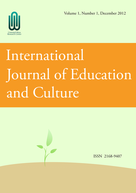


Volume 13 Issues 3-4 (2024-12-31)
Volume 13 Issues 1-2 (2024-06-30)
Volume 12 Issues 3-4 (2023-12-31)
Volume 12 Issues 1-2 (2023-06-30)
Volume 10 Issues 1&2 (2021-06-30)
Volume 9 Issues 3&4 (2020-12-31)
Volume 9 Issues 1&2 (2020-06-30)
Volume 8 Issues 3&4 (2019-12-31)
Volume 8 Issues 1&2 (2019-06-30)
Volume 7 Issues 3&4 (2018-12-31)
Volume 7 Issues 1&2 (2018-06-30)
Volume 6 Issues 3&4 (2017-12-31)
Volume 6 Issues 1&2 (2017-06-30)
Volume 5 Issues 3&4 (2016-12-31)
Volume 5 Issues 1&2 (2016-06-30)
Volume 4 Issues 3&4 (2015-12-31)
This article explores how Gardner’s theory of Multiple Intelligences (MI) can be translated into classroom practice in a selected group of nine grade students in the greater Athens area in Greece. To this end, attempts were made to ascertain if the general claims of the theory can be verified with the above group of students within the framework of a science unit of the Greek curriculum dealing with the topic of ‘acid rain’. Furthermore, efforts were exerted to find out to which degree the MI theory may contribute to personalize learning in the above topic of the science unit.
Studies relevant to school, family and community collaboration have known knowledge a constant growing boom worldwide particularly in the last decades. A large number of these studies focus on the necessity to enhance parents’ role, mainly through supporting structures of their training. This need constantly stimulates increased efforts to seek opportunities and set out best strategies and methods that could train parents so to effectively support their children’s education and family, school and community collaboration. This paper seeks to present the efforts have been made and developed in Greece in recent decades. The paper is a review of important parent education programs in Greece, coming from various Agencies and Institutions and demonstrates the methodology, the dynamics and the potential of this field.
The 5th Untested Ideas International Research Conference Collaborating for Change in Research and Practice June 23 – 25, 2017